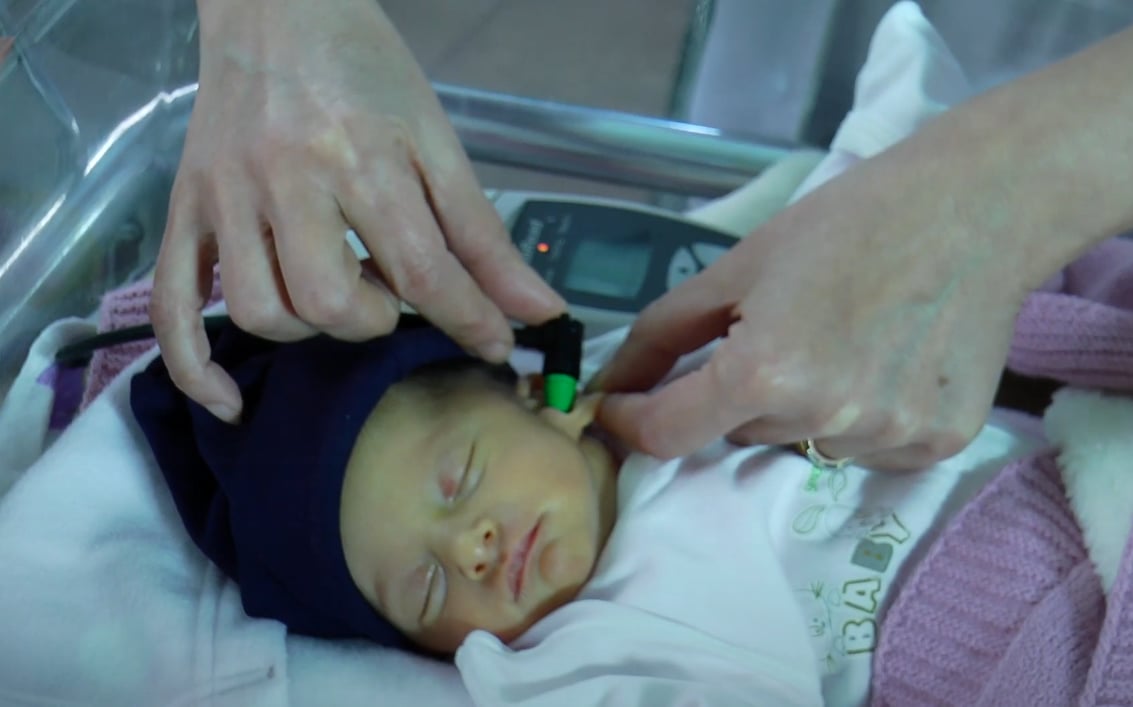
Hearing loss is one of the most common congenital conditions in humans, affecting 1-2 out of every 1,000 newborns. In young children, hearing loss can lead to speech development disorders and affect psychoemotional development. Early diagnosis and timely rehabilitation are essential for children with prelingual hearing loss.
Newborn hearing screening is a quick and painless procedure that helps identify hearing issues in newborns. If necessary, it allows for more detailed follow-up examinations.
To track children with hearing impairments in Armenia, ''Arabkir'' Medical Complex – Institute of Child and Adolescent Health, WHO Collaborating centre together with the Erebouni Medical Center, developed a pilot neonatal hearing screening program in 2007. Since July 2008, MC "Arabkir" has been conducting hearing screenings and serves as a reference center.
Thanks to the support of the Grant Aid for the Mass Human Security Project (GGP) of the Embassy of Japan in Moscow in 2010 (covering 10 maternity hospitals), GGP of the Embassy of Japan in Yerevan in 2018 (covering 22 maternity hospitals), and Hear the World, the World Vision Foundation has expanded the program to include 45 maternity hospitals, maternity wards, and neonatal intensive care units throughout Armenia. This initiative now allows screening of over 90% of newborns.
Annually, around 33,000-34,000 children are screened, and approximately 35 children with hearing impairments are identified. All children with hearing impairments are enrolled in dispensary observation at the Audiological Center of MC "Arabkir." If necessary, they are provided with hearing aids, and those who need further treatment are referred for cochlear implantation.
The Audiological Center at MC "Arabkir" is a specialized children's center in Armenia that provides medical examinations and medical-psychological-pedagogical rehabilitation for children with hearing impairments. To date, more than 1,100 children under 18 years of age with sensorineural hearing loss from across Armenia have been registered in the dispensary.
Newborn hearing screening guide
Neonatal audiological screening is fully funded by the state.
Hearing screening is conducted in two stages:
Stage I (Screening):
This stage is performed in maternity hospitals and neonatal intensive care units/wards as close to discharge as possible, preferably no less than 12 hours after birth. Hearing examinations are carried out on all newborns.
If hearing impairment is suspected, the newborn is referred for rescreening, which is conducted at 2 to 4 weeks of age. Rescreening is performed in audiological centers in Yerevan, regional audiological centers, or in regional maternity hospitals and units that carry out screening examinations.
Stage II (Diagnostic):
This stage is performed in audiological centers for children who have an abnormal result from Stage I screening, as well as for children with risk factors for hearing loss. The examination should be conducted by the age of 3 months.
The results of the examination are forwarded to the family doctor or district pediatrician.
Stage II includes acoustic impedance measurement, otoacoustic emission (OAE) testing, as well as recording short-latency auditory evoked potentials (SLEP) and/or the Auditory Steady-State Response (ASSR) test. These are the most informative tests for determining hearing threshold equivalents. These tests are conducted by audiologists.
The results are then forwarded to the family doctor or district pediatrician, and the parents receive assistance from psychologists and sociologists.
How to Prepare for the Examination?
The screening examination does not require any special preparation. However, it is recommended to conduct the examination when the baby is calm or asleep, such as 1 hour before feeding or 20 minutes after feeding.
The procedure itself lasts no more than 5 minutes. At the end of the examination, the device will display either "PASSED" or "NOT PASSED." "PASSED" means that the baby's hearing is normal, while "NOT PASSED" indicates that there may be an issue, and a repeat examination is necessary.